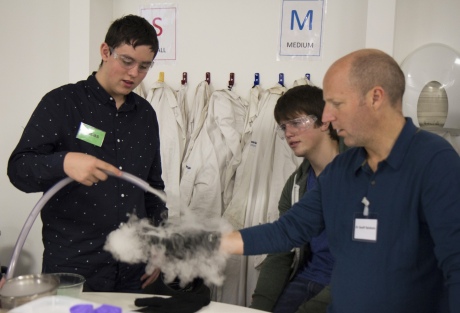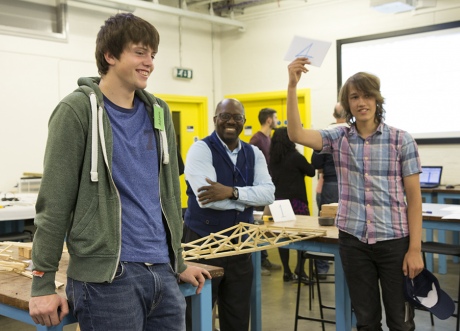Gifted students with learning disabilities attend STEM workshop at Imperial
by Ellyw Evans

A programme funded by NHLI aims to nurture neurodivergent students by recognising how to apply their strengths to science and engineering.
A series of workshops designed to support gifted students with learning difficulties – also known as twice exceptional (2e) or neurodivergent – were hosted at Imperial on 20 and 21 September. Through a series of hands-on science activities and talks, 26 secondary school students accompanied by their parents or teachers were encouraged to identify their strengths and develop strategies to support their learning.
The two-day event was organised by 2eMPower, a team of seven that includes two Imperial members of staff, two Australian academics (specialists in 2e education), a secondary school science teacher, a special educational needs coordinator and a student representative who is 2e. Together they have developed a suite of unique workshops for neurodivergent students and their parents designed to support and inspire neurodivergent students.

The 2eMPower team (missing Dr Simon Foster), with Dr Sunday Popo-Ola
With over a million pupils in the UK with a learning disability such as dyslexia, Asperger’s or ADHD, traditionally the focus by schools has been to address their weakness, for example, being a slow reader or poor speller. However, this can result in negative consequences, with children from an early age made to feel incompetent compared to their peers.
2eMPower recognises that students with autism, Asperger’s and dyslexia, as well as other learning difficulties, also possess strengths related to the fact that their brains process information in a different way. Such strengths might include a ‘tunnel vision’ approach to problem solving, creativity, being visionary and the ability to think outside the box and find innovative solutions to problems – qualities that would bode well for a successful career in STEM (science, technology, engineering and mathematics).
The workshops, which is funded by Imperial’s the National Heart and Lung Institute (NHLI), also recognise the need to support the parents and teachers of 2e students through a separate programme focused on educating 2e students, which ran concurrently with the student programme.
Sara Rankin, Professor of Leukocyte and Stem Cell Biology at Imperial’s National Heart and Lung Institute, developed the 2eMPower project based on her personal experience as a 2e student. She said: “We want 2eMPower them [2e students] by developing their self-efficacy and teaching them how to harness their strengths”
Dyslexia Awareness Week
Dyslexia, the most common learning disability in the UK, is recognised this week through Dyslexia Awareness Week. This year’s theme is ‘Positive about Dyslexia’ – an approach which is at the core of 2eMPower’s workshop.
The workshop, aimed at year 10-12 students who have an interest in STEM subjects, offered them a unique opportunity to learn about STEM in an environment optimised for teaching neurodivergent students. The students, who had travelled as far as Cornwall and Salisbury, also had the opportunity to engage with current undergraduate engineering students, with the hope of raising their aspirations and promoting higher education.
Physics busking
Dr Simon Foster, Outreach Officer for the Department of Physics, ran a ‘physics busking’ session. Working in small groups, the students familiarised themselves with different physics experiment that included dry ice and fairy liquid, and magnetic custard! During the physics busking showcase, each group performed and explained their experiment to the teachers and parents who were judging.

Student performing the 'dry ice bubble' experiment
Engineering challenge
The finale of each day was the engineering challenge led by Dr Sunday Popo-Ola, Research and Teaching Fellow at the Department of Civil and Environmental Engineering. The students discovered how engineers design and build bridges, learning first hand about the physics of construction. Students were tasked with building their own structures from wood, ensuring they incorporated the basic principles of physics into their designs.
The twist in this activity was that students were given a set amount of money each, they could choose to work alone or in a team of any size and they had to use their money to buy equipment, materials and knowledge to enable them to build their bridges, thus testing their collaborative, team building and entrepreneurial skills. Bridges were later tested for their strength and the winning team was announced.

Winners of the engineering challenge with Dr Popo-Ola
Dr Sunday Popo-Ola, speaking after the event said: “It’s been a beautiful day of students building bridges and testing them. They were able to perform well as teams, and to deliver the task assigned to them. I could even see that some of the students were thinking faster than normal students. For me, it’s been a pleasure to have this opportunity to inspire them and enhance their knowledge of STEM.”
Positive feedback
The 2eMpower team are undertaking detailed evaluation of the workshops in order to improve future sessions. The responses collected from parents and teachers for the latest workshop were overwhelmingly positive:
“The most valuable thing was definitely for my child to experience Imperial College, quality lecturing, with some similar students whilst being pushed outside of his comfort zones.”
“He's been a different boy since the workshop, and his confidence has grown enormously, especially after the bridge building exercise with the delightful and exuberant Dr Sunday!”
“I left Imperial College last night feeling encouraged and with renewed hope for my autistic son. Please continue your vital work, and I hope you secure funding to arrange more of these workshops.”

Attendees for the second day of the workshop
If you would like to find out more about 2eMPower, please email Sara Rankin.
For full information about all the activities planned for Dyslexia Awareness Week 2017, please visit the website.
Article text (excluding photos or graphics) © Imperial College London.
Photos and graphics subject to third party copyright used with permission or © Imperial College London.
Reporter
Ellyw Evans
Faculty of Medicine Centre